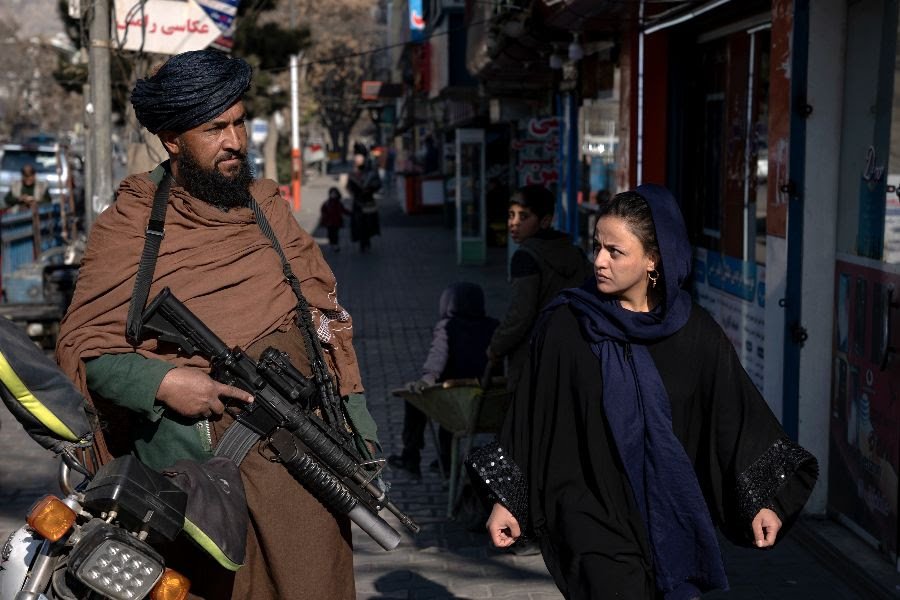News Desk
The United Nations has announced that it is reviewing its operations in Afghanistan. The UN has asked all its staff to remain at home after the Taliban banned Afghan women from working for the world body, Radio Azadi says in its latest report.
The hundreds of Afghan women employed by the UN are critical in delivering life-saving aid in Afghanistan, where millions are at risk of starvation, Abubakar Siddique, a senior correspondent at RFE/RL’s Radio Azadi reported.
In its statement on April 11, the UN said the Taliban’s ban has forced it to make an “appalling choice between staying and delivering in support of the Afghan people and standing by the norms and principles we are duty-bound to uphold.”

The UN added that “any negative consequences of this crisis for the Afghan people” is the responsibility of the Taliban.
In response, chief Taliban spokesman Zabihullah Mujahid called the ban an “internal issue” and blamed the devastating humanitarian crisis on international “sanctions and pressure.”
“Considering the emergency situation in Afghanistan, it is necessary for the member countries of the United Nations to resolve the problem of frozen Afghan assets, banking, travel bans, and other restrictions as soon as possible so that Afghanistan can progress in economic, political and security areas,” he said.
The Taliban appears to be using the issue of women’s rights as a bargaining chip to gain concessions from the international community.
When the Taliban seized power in 2021, foreign governments immediately cut development funding to Afghanistan and imposed tough sanctions on the new government.
Since then, the Taliban’s repression of women, including severe restrictions on female education and employment, has further isolated its government. The militant group remains unrecognized by any country.
In December, the Taliban banned Afghan women from working for local and foreign NGOs, a move that disrupted critical assistance to millions of Afghans. On April 4, the Taliban expanded the ban to include the UN, further interrupting aid.

What’s next:
The Taliban seems to be gambling on the lives of over 28 million people, or two-thirds of the population, who need life-saving assistance to survive.
The UN has suggested that it could suspend its operations in Afghanistan if the Taliban maintains its ban, a move that is likely to have disastrous consequences.
The Taliban’s ban also appears to have contributed to international donors, most Western nations, already reducing funding to aid organizations.
The UN’s World Food Program (WFP) has warned that it will have to cut assistance to 9 million people in Afghanistan if it does not immediately receive additional funding.
In the latest instance of extreme restrictions on leisure activities in Afghanistan, Taliban authorities have closed video game parlors and shops selling foreign movies, TV shows, and music in the western Afghan city of Herat. The group had earlier closed sheesha cafes and restaurants run by women in the city.
The Taliban has not been recognized by any country since forcibly seizing power in Afghanistan. But the militant group has tried to boost its legitimacy by gaining control of Afghan diplomatic missions abroad. Many Afghan embassies and consulates around the world are still run by diplomats appointed by the previous Western-backed government in Kabul.
Deadly clashes erupted between Taliban fighters and members of the Afghanistan Freedom Front (AFF), an armed resistance group, in the northern province of Parwan this week.
The Taliban claimed to have killed eight AFF fighters, including two commanders, Basir Andrabi and Akmal Amiri. The AFF has not confirmed the death of Amiri.
In a statement on April 13, the AFF alleged that the Taliban had launched a crackdown in the capital, Kabul, and the provinces of Parwan, Panjshir, and Kapisa against civilians suspected of having ties with the resistance group. The AFF also alleged that the Taliban prevented people from attending the funerals of the slain fighters.
Local sources told Radio Azadi that the Taliban had raided dozens of houses.
A handful of small armed groups, mostly comprised of members of Afghanistan’s former armed forces, have opposed Taliban rule in different regions of the country. But they remain weak and have no sanctuary or outside help, experts have said.
The Taliban has been accused of using brute force to quell the groups, including the alleged killing and torture of resistance fighters and the detention and beating of civilians.
The Taliban’s hardline government has led to the emergence of new resistance groups, including the AFF. The Taliban has refused to share power or grant fundamental rights to citizens. And with the militant group stamping out any kind of dissent, there appears to be little room for peaceful opposition to its rule.

The High Asia Herald is a member of High Asia Media Group — a window to High Asia and Central Asia

